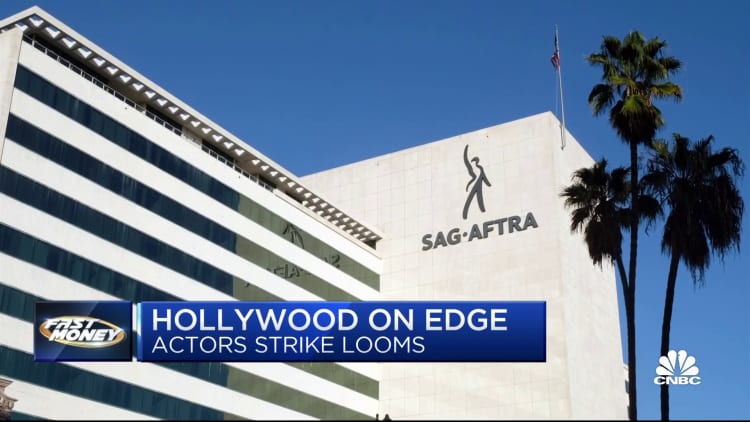Skynesher | E+ | Getty Images
LOS ANGELES — The 2023 box office is inching closer to pre-pandemic levels, but inconsistent performances from blockbuster features in the first six months of the year will put a lot of pressure on second-half releases.
While the domestic box office has tallied $4.46 billion in ticket sales through June 30, a nearly 20% increase over the same period in 2022, it still lags behind 2019, the benchmark of a time before the pandemic, according to data from Comscore.
Ticket sales are down 21% from four years ago, but that’s not the only thing that’s down. So, too, is the number of wide releases.
From January to June 30 in 2019, 57 films were released in 2,000 theaters or more. In 2023, there have been only 45 releases during that same period.
“It really isn’t a fair comparison just going dollars to dollars,” said Mike Polydoros, CEO at PaperAirplane Media.
And quantity matters. While blockbusters and franchise films can draw big crowds, a steady stream of low- to mid-tier budget movies is also critical to the overall success of the industry. Diversity of content is also key, with audiences clamoring for a wider array of genre films, from horror and drama to romance and comedy.
The more opportunities audiences have to head to cinemas, the better, industry experts told CNBC.
Hit and miss
Of course, quality is a big factor in a film’s box office success, too. It’s not enough to simply fill the annual slate with product; the product needs to be good.
So far this year, the box office has seen a number of blockbusters fall short of expectations after they were projected to lure in moviegoers and bolster the domestic haul.
Warner Bros.‘ “Shazam! Fury of the Gods” and “The Flash” dramatically underperformed, as did Disney’s “Ant-Man and the Wasp: Quantumania” and “Elemental.”
Meanwhile, Universal’s “Super Mario Bros. Movie,” Disney’s “Guardians of the Galaxy: Vol. 3” and Sony’s “Spider-Man: Across the Spider-Verse” have managed to capture audience attention, alongside a slew of horror movie titles including Paramount’s “Scream VI” and Universal’s “M3gan.”
Still from Sony’s “Spider-Man: Across the Spider-Verse.”
Sony
“Even though a few releases haven’t lived up to bullish expectations on their own individual terms, 2023’s box office to date is generally about as healthy as could be expected,” said Shawn Robbins, chief analyst at BoxOffice.com.
Robbins said the main takeaways from the first half of the year are that comic book and nostalgia-driven films are “not the novelties they once were.” While older millennial audiences have been the driving force behind much of the last two years in box office recovery, studios would do well to begin catering to younger generations going forward, he said.
“Moviegoers are going to be more selective with the content they choose to spend money on, especially as the broader economy and stagnant wage growth continue to be an issue for most average Americans,” Robbins said.
Summer sizzle or fizzle?
That pullback has already begun with the 2023 summer movie season.
Starting the first Friday in May and running until Labor Day weekend, the summer movie season typically represents 40% of all movie ticket sales for the year.
So far through July 2, the summer box office has tallied $1.88 billion. That’s 1.7% lower than 2022 levels across the same period, according to Comscore data.
In summer 2022, the box office got a boost from Tom Cruise’s “Top Gun: Maverick,” a Paramount and Skydance feature. Between its May 27 release and July 2 of last year the film tallied $555.4 million, making it the highest-grossing film during that time at the box office, according to Comscore.
For comparison, this summer’s highest-grossing film so far is “Guardians of the Galaxy: Vol. 3,” which was released May 5 and has generated $354.9 million through July 2.
“While the year is running well ahead of 2022, summer numbers are at this point struggling to surpass last year’s,” said Paul Dergarabedian, senior media analyst at Comscore. He noted that 2022 also offered “Doctor Strange in the Multiverse of Madness” and Universal’s “Jurassic World: Dominion.”
So far this summer, there has not been a runaway hit at the box office. While the third Guardians film and Sony’s animated Spider-Man sequel have performed well, it remains to be seen if other recently released films, such as Disney’s “Indiana Jones and the Dial of Destiny,” Universal’s “Ruby Gillman, Teenage Kraken” or Paramount’s “Transformers: Rise of the Beasts,” will add significantly to the domestic box office haul.
“More movies on the slate have boosted the year-to-date bottom line, while some underperforming summer films have placed intense pressure on the releases awaiting their turn at the multiplex to deliver on the promise of their pedigree and marketing,” he said.
Those releases include the much-anticipated Warner Bros. feature “Barbie,” Universal’s “Oppenheimer,” Disney’s “Haunted Mansion” and Paramount’s “Teenage Mutant Ninja Turtles: Mutant Mayhem,” which all release before Labor Day.
“It’s important to keep in mind that the compressed ecosystem of the 18-week summer movie season has much more pronounced ups and downs than any given full year, and it’s much too early to make any big pronouncements about the ultimate success or failure of the period,” Dergarabedian said. “The good news is that some of the biggest films of the summer are still to come this month, and as a secret weapon, August is loaded with high-profile films that could give summer a back-end turbo boost.”
The second half
Among the expected back-half blockbusters: Sony is set to bring Spider-Man villain Kraven the Hunter to the big screen in October; Universal has “The Exorcist: Believer” and “Trolls Band Together”; and Warner Bros. has “Dune: Part Two,” “Wonka” and “Aquaman and the Lost Kingdom.”
Disney is set to release “The Marvels” and “Wish,” and Lionsgate has “The Hunger Games: The Ballad of Songbirds and Snakes.”


“The second half of summer looks very strong, much better than last year,” said Polydoros. “I wouldn’t be surprised if 2023 comes close to $10 billion total box office.”
That would put the 2023 box office around 12% down from 2019 for the full year. Of course, Polydoros warned, the current Writers Guild of America strike could affect the box office this year and next, if film production shutdowns continue and release dates get pushed.
BoxOffice.com’s Robbins also addressed Hollywood’s labor concerns, noting that the ongoing writers strike and the threat of an actors strike could derail the progress gained at the domestic box office over the last two years.
For Robbins, reaching 2019 levels in 2023 was “never a realistic goal.” What matters is continued growth year over year, he said; the target for the domestic box office this year should be to top last year’s results of $7.5 billion.
“With all of that in mind, I think there’s still plenty of reason to be optimistic about where the industry stands in the long term, but there are always hurdles to overcome,” he said. “Audiences have declared their willingness to visit movie theaters on a regular basis when the movies are both appealing in nature and generating positive buzz among peer circles.”
Disclosure: Comcast is the parent company of NBCUniversal and CNBC.
This story originally appeared on CNBC

